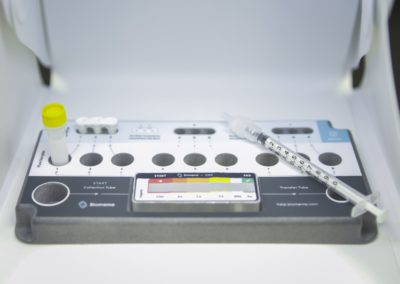Improving healthcare outcomes now and into the future.
COVID-19 has challenged traditional approaches to healthcare. The global pandemic has provided Canada with the opportunity to see the capabilities within our own healthcare system. Canadians have adapted and innovated quickly to meet the immediate, yet evolving, needs of the public, and this ability to adapt is arguably most evident in the testing space.
From the very beginning of the pandemic, testing has been front and center, and while it is universally agreed that testing is a critical piece of the COVID-19 puzzle, it has not been perfect. Testing strategies have varied greatly across provinces; testing capacity, especially outside of urban regions has been a challenge; eligibility for a test has not been clearly communicated and longwait times for results have impacted data sets for government officials. There is also the issue that hospital labs weren’t traditionally set up for the volume of testing that is now needed, and staffing these settings continues to be a challenge.
Though Canada must continue to improve and innovate its testing landscape, the benefits of testing have begun to show the possibilities of our healthcare system and the ability to strengthen Canada’s response to COVID-19 and evolving public health needs. The expansion of testing options across Canada has helped to alleviate the burden and pressure placed on Canada’s public laboratory system, providing additional avenues and support for Canadian employers and communities to receive critical, rapid results where and when they are needed. Leveraging Canada’s growing testing capabilities ensures that we are providing governments, the healthcare system and employers with effective and efficient solutions to help them identify and respond to outbreaks. Timely and accurate testing has enabled hospitals and clinics to resume medical procedures; allowed seniors in congregate settings to have improved lifestyles and less isolation; given governments critical data sets to help them make informed decisions, and helped companies start to re-open, giving their employees a safe workplace and peace of mind. The stability and confidence that testing has been able to provide thus far demonstrates the value of continued innovation in the space, as there is more that can be done. Innovative testing tools will continue to be a critical partner in Canada’s ongoing response to the global pandemic; and should continue to be leveraged as such.
Testing gives us vital answers in traditional care settings, and simultaneously provides support in areas of the country that have long been struggling – rural and remote regions.
Sample prep tray: used in streamlining extraction of RNA from samples as part of the rapid COVID-19 mobile test solution offered by Precision Biomonitoring.
Innovative, mobile testing has been a key solution to the overburdened, and often understaffed, frontline workers of rural and remote communities, enabling them to have rapid results despite obstacles, such as geographical proximity to a lab. Testing in these regions has not only provided a solution to the immediate public health need, but also proves that there are Canadian solutions to uniquely Canadian issues – and that these solutions may continue supporting the needs of these communities long after COVID-19. Innovative testing developments and advancements born from an immediate need now have the potential to address some of the larger, pre-existing challenges faced by these groups and communities.
Prior to COVID-19, our team at Precision Biomonitoring specialized in onsite eDNA surveillance, focused on the identification of target organisms in aquatic and terrestrial environments. However, the onset of the pandemic made us step back and see our solutions in an entirely new light. Challenging ourselves, we quickly adapted and diversified our testing devices to meet public health needs for human health needs across the country. In doing so, we have built relationships with companies and teams from a variety of sectors we had yet to work with, including working with Indigenous communities, to help support their response to the pandemic.
COVID-19 has forced us to change the way we view health, which has opened up the doors to possibilities that were often difficult to see while operating in the silos of our healthcare system. Thinking ahead to life beyond the pandemic, we must not forget the importance of adaptability and its potential to address both new and existing healthcare challenges.





